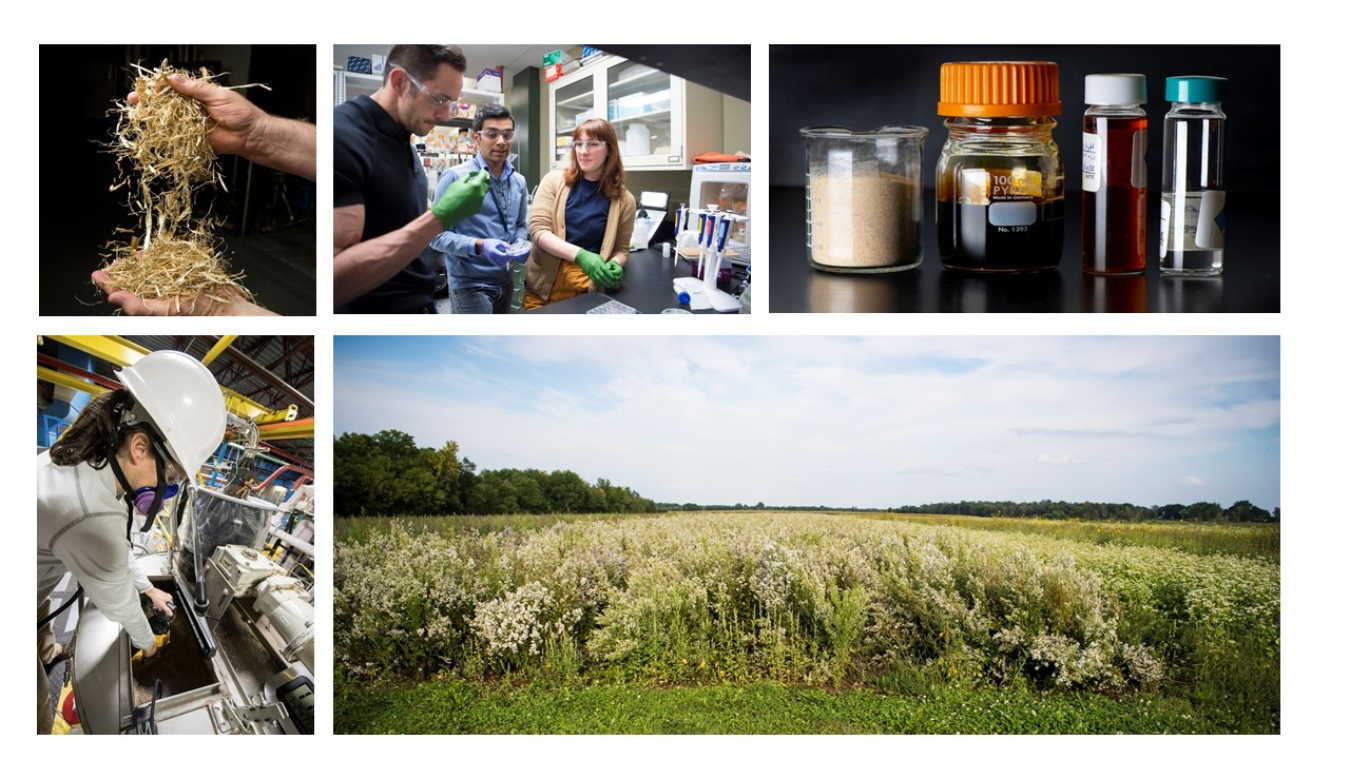Bioprose Blog: Insights from EERE Acting Deputy Assistant Secretary for Transportation and BETO Acting Director, Michael Berube
October 21, 2020
Every October, we celebrate Bioenergy Day by spreading awareness of how the efforts of the Bioenergy Technologies Office (BETO) are contributing to groundbreaking technologies to produce the next generation of biofuels and bioproducts that:
- Diversify transportation energy options
- Lower transportation sector emissions
- Stimulate the domestic economy
BETO also supports research and development (R&D) and analysis to ensure that these bio-based options are based on sustainable practices.

Images of biofuels and bioproducts. Photos by Dennis Schroeder / National Renewable Energy Laboratory
BETO R&D: Transforming biomass and wastes into renewable fuels and products
BETO drives the transformation of renewable carbon and waste resources into biofuels, bioproducts, and biopower via biochemical, thermochemical, and hybrid conversion pathways. The feedstock that is converted to bioenergy include agricultural residues, forestry residues, dedicated energy crops, algae, and waste streams. These waste streams can take the form of municipal solid waste, bio-solids, waste food, plastics, industrial waste gases, and even CO2. The diversity of feedstocks is both a great opportunity and a challenge for bioenergy.
A key area of emphasis is the R&D of biofuels for aviation, marine, and heavy-duty transportation, where there are not as many alternative fuel options available.
While biofuels offer a low-carbon liquid fuel for transportation, BETO and industry recognize the need to continue to drive down biofuel costs. In fact, between 2014 and 2019, DOE R&D has reduced the cost to produce bio-fuels by close to 50%. Although additional work needs to be done, we can now see the potential for these fuels to be cost competitive. The BETO report, Integrated Strategies to Enable Lower-Cost Biofuels, outlines five key strategies to help achieve lower fuel production costs in an integrated biorefinery, and outlines high-level research needed across the biofuel supply chain.
The synergy between biofuels and bioproducts
One key strategy for improving the economic viability of biofuels is bioproducts—renewable chemicals or materials made from biomass. By investing in bioproduct R&D, BETO can help lower technology risk and support scale-up for biofuels. Bioproducts rely on the same feedstocks, use the same infrastructure, and are made using many of the same processes and technologies as biofuels. The difference is that these high-value bioproducts can fetch a higher price than fuels and can be competitively produced at lower volumes. This is the same as petroleum today, where 76% of the barrel goes to fuels but 45% of the revenue comes from chemical products.[1]
Successful commercialization and deployment of bioproducts have the potential to build the bioeconomy supply chain, lower technology risk, and expand infrastructure to enable biofuels in the future.
Scientific research drives advances in bioenergy
Leading scientists at DOE National Laboratories and partner universities pursue the advancement of biomass feedstock production, conversion, and scale-up. BETO’s R&D supports industry’s efforts to demonstrate and deploy technologies. BETO also takes part in the Biomass Research and Development Board to coordinate efforts with other federal agencies.
The future is bright for U.S. biofuels
A robust bioenergy industry will not only provide Americans with renewable energy alternatives, but also support several sectors, from farming and trucking to microbiology and chemical engineering. Bioenergy and bioproduct production has significant potential to serve as a vehicle for economic opportunity for communities throughout the nation.
BETO’s support of the next-generation domestic bioenergy industry is essential for the United States to remain competitive in the global, biomass-based fuel, product, and chemical markets.
To read more of BETO’s research, collaborations, and successes, please visit BETO’s Bioprose blog. Happy Bioenergy Day!
[1] Bloomberg New Energy Finance, EIA, American Chemical Council
Michael Berube

As the deputy assistant secretary for sustainable transportation and fuels, Michael Berube oversees Office of Energy Efficiency and Renewable Energy's (EERE) Vehicle, Bioenergy, and Hydrogen and Fuel Cell Technologies offices, as well as the Joint Office of Energy and Transportation. This portfolio focuses on research and development to increase access to domestic, clean transportation fuels and improve the energy efficiency, convenience, and affordability of transporting people and goods to support U.S. energy security, economic productivity, and competitiveness.
He brings more than 25 years of experience in the automotive industry to his EERE post, specifically in the areas of environmental compliance, energy and safety policy, product development, and marketing. He has worked on a broad range of electric vehicle, connected car and advanced powertrain initiatives. Michael also led multiple environmental and energy initiatives within the Chrysler Corporation.
Michael has a Bachelor of Science degree in civil engineering from the Massachusetts Institure of Technology (MIT). He later returned to MIT as both a graduate student and researcher and received a master's degree in the Technology and Policy Program and a master's degree from the Sloan School of Management. He was recognized for his early work on corporate sustainability and led research for the MIT International Motor Vehicle Program.

